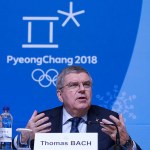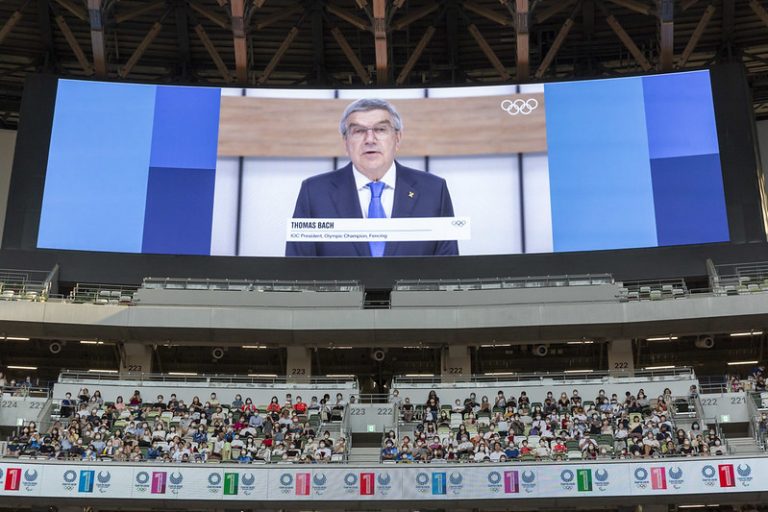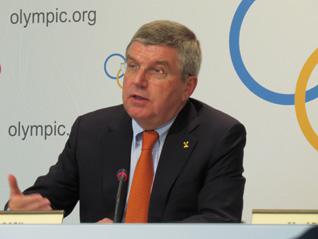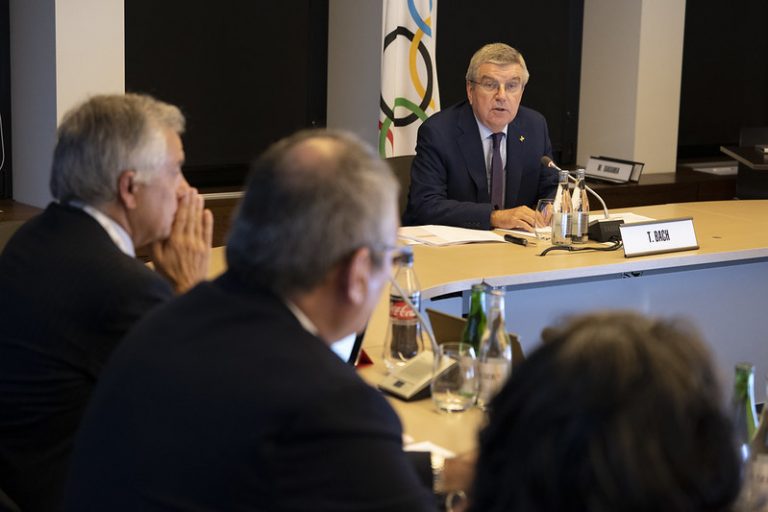BidWeek, Reporting From Gangneung, South Korea – The entrance of the Korean Unified Team during the Parade of Nations Friday night at the PyeongChang 2018 Opening Ceremony, was one of the most moving moments for me at any Olympic ceremony I’ve attended. The flag bearers, one from the South and one from the North presented a scene that was repeated once again when Women’s hockey team mates from both sides of the border jointly made the final torch handover to cauldron lighter Yuna Kim.

Indeed my eyes began to well up, and not because of the blistery winds and sub-zero temperatures at PyeongChang Olympic stadium – but because in the almost 20 years covering PyeongChang’s aspirations to host these Games I’ve learned that the sincerity of the South Korean’s message of peace is real.
But it was a message that the International Olympic Committee (IOC) rejected – twice.
That’s why it is a little more than disappointing to hear the IOC take a share of credit for the unification at these Games as IOC President Thomas Bach did once again Friday night.
“Two years ago in Rio de Janeiro, with the first-ever Refugee Olympic Team, the IOC sent a powerful message of hope to the world.” Bach said.
“Now in PyeongChang, the athletes from the teams of the ROK and DPRK, by marching together, send a powerful message of peace to the world. Let us share this Olympic experience with the world.”
In the end, South Koreans had to ignore their staunch desire for peace to achieve their Olympic dreams, and finally win the 2018 Olympic bid on the third try – “three times lucky,” was the message on July 6, 2011 when PyeongChang defeated Munich and Annecy to bring the Games here beginning this week.
But it wasn’t luck. It was determination and the willingness to learn.
“Twice the IOC rejected the ‘peace and reunification’ strategy,” said Terrence Burns, Chairmain of T Burns Sports Group who provided strategic communications planning for the PyeongChang 2018 bid.
“I assumed (and still do) they rejected it because they didn’t believe they could hang the promise of an Olympic Games on such an unstable and risky situation,” he said in an email.
Burns had previously worked with PyeongChang’s rivals, both winners Vancouver 2010 and Sochi 2014 – so he had plenty of time to dissect the early South Korean failures.
“I knew the message of the [PyeongChang] bids in 2010 and 2014 didn’t resonate. So when 2018 hired me, they wanted to do it again. I said “no”.
“Frankly it was a battle at first. But I explained why and they accepted.”
Burns said the peace and reunification strategy was never spoken of again, instead the bid implemented a ‘New Horizons” campaign that focused on the youth and opportunity in South Korea, and leveraged newly crowned figure skating Champion Yuna Kim, Friday night’s cauldron lighter, as an inspirational face.
That worked, winning PyeongChang the election in a landslide. That’s what the IOC wanted, and that’s okay.
But peace and reunification is a message entirely of the South Koreans. Critics will say that North Korean leader Kim Jung Un is leveraging the Olympics for political capital internationally, but that’s not the point.
On Saturday night the Women’s Unified Korean Ice Hockey team debuted against the Swiss team, a real union of athletes in a game where communication, teamwork and ‘chemistry’ are key. The squad is comprised of 23 of the original South Korean athletes, and 12 North Korean player who were added after the IOC struck a deal with the two National Olympic Committees and the International Hockey Federation.
The team’s coach, Canadian Sarah Murray told Reuters “we feel like one team. Not that we’re making a political statement, we’re just here to win.”
After only one practice Game ahead of Saturday’s tournament opener, she said the team is working together well.

With the obvious lack of North Koreans cheering for their athletes at the Games, the North instead sent 200 “official” fans, or cheerleaders. They all dress and act in unison, and all in red. They were the most entertaining part of the match, singing and dancing and literally leading cheers – motivating the excited Korean fans into a frenzy every time their side managed to touch the puck. But sadly for the Koreans, that didn’t happen too much – the Unified team were shut out 8 to 0.
Still the North Korean ‘fans’, hand-picked albeit, were cheering for their South Korean team and waving Unified flags adorned with the entire Korean Peninsula. That’s something.
What could be more memorable than seeing the North Korean Cheerleaders dance to ‘Uptown Funk’ by Mark Ronson and Bruno Mars, and starting human waves – a very Western concept, around the arena? Would that have ever happened without the PyeongChang Games? Not likely.
The crowd of South Koreans were behind it all as well, comfortably waving Unified flags and banners, while setting aside their own Taegukgi flag, if only for the evening.
Bach was there, of course – sitting with high level guests South Korean President Moon Jae-in and Kim Jong-un’s sister Kim Yo-jong. But spectators didn’t notice. The dignitaries were sitting behind a group of those animated cheerleaders.
So Mr. Bach, congratulate South Korea for their efforts toward peace. The Olympics provided a platform. The Koreans did the rest.
GamesBids.com is reporting from the PyeongChang 2018 Olympic Winter Games this week. Follow us @gamesbids on Twitter or on Facebook for updates


